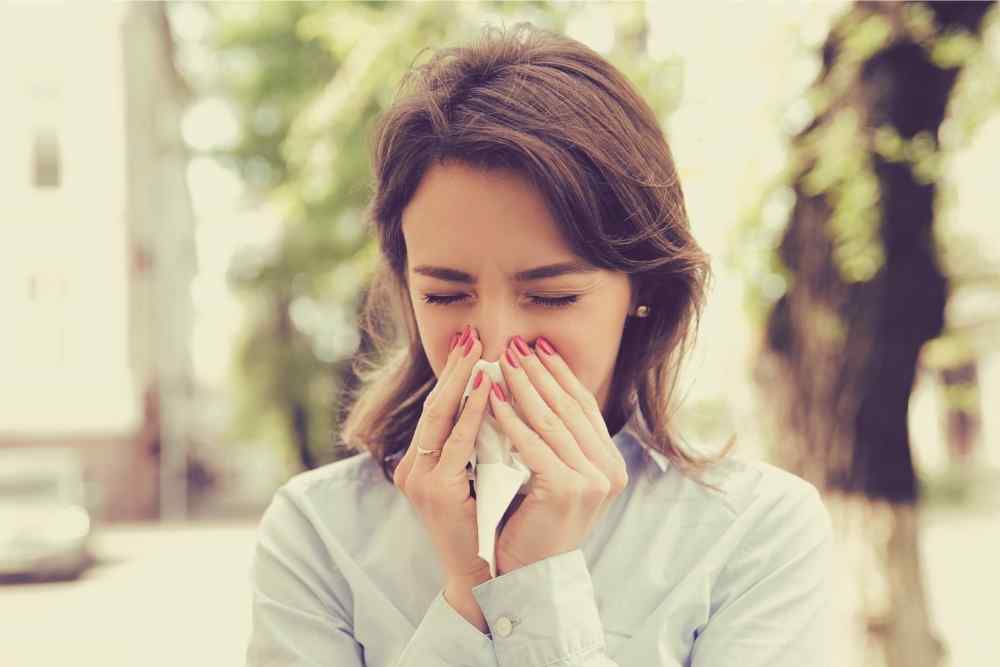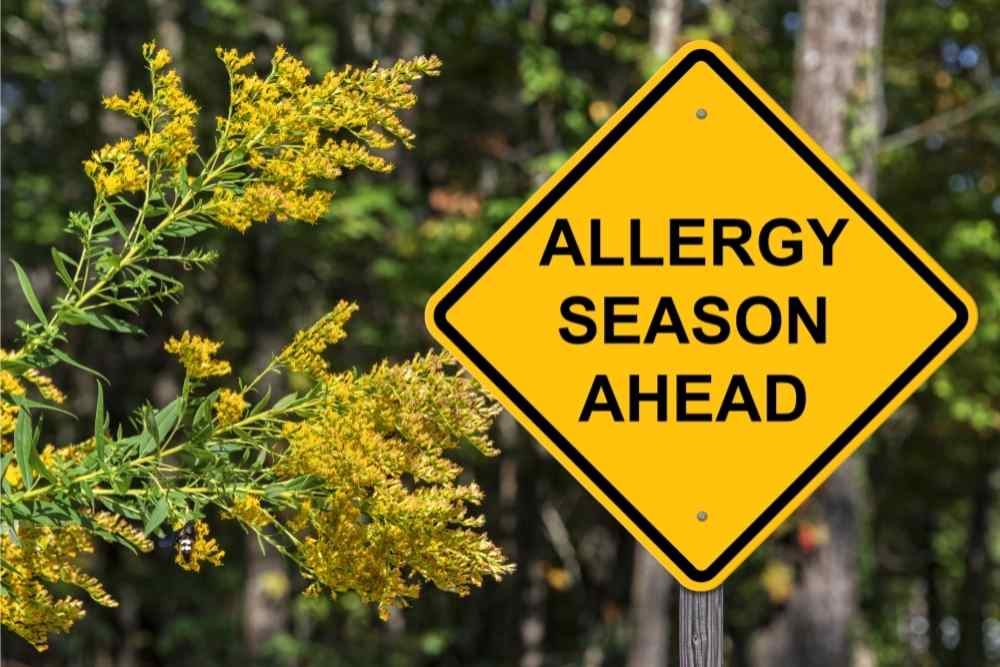Why Use CBD Oil For Allergies [Has Been Proven To Work!]
Most everyone can relate to the feeling of a runny nose, stuffy sinuses, or chronic coughing. These are the common signs of allergies. Allergies affect more than 50 million Americans every year. There are various treatments available. Some treatments are prescription and some are over-the-counter. These can vary in their efficiency. Many consumers are looking to cannabidiol (CBD) as an alternative method to deal with allergies. CBD is an extract of the cannabis plant.
What Are Allergies? Chronic vs. Seasonal Allergies
The basic mechanism that controls allergies in the human body is inflammation. This refers to a reaction to some kind of outside stimulus that your immune system has deemed to be a threat. On its most basic level, inflammation is the physiological process that the human body uses as a protective response. Allergies are simply the hypersensitivity of this immune system.

The Symptoms of Allergies Include:
- Nasal and eye irritation
- Itchiness or rash throughout the body
- Chronic sneezing or coughing
- Runny nose
- Impacted sinuses and/or congestion
- Swelling and/or inflammation of the lips, tongues, eyes, and/or face
- Shortness of breath
- Tightness in the chest
- Facial pain
All these symptoms are a result of your body having an allergic response. This allergic response happens when your immune system produces an antibody known as Immunoglobulin E (IgE). The immune system also produces a substance called histamine. Both Immunoglobulin and histamines result in the symptoms listed above.
If your body has a consistent allergic response to some kind of food or substance, consider it a chronic allergy. The most common kind of chronic allergy is a food allergy. Some of the more severe types of chronic allergies can lead to other chronic conditions, including:
Conditions Associated With Chronic Allergies:
- Asthma
- Chronic obstructive pulmonary disease (COPD)
- Various autoimmune diseases
- Rhinitis
- Eczema
Seasonal Allergies
However, there is also the possibility of seasonal allergies. People also refer to this as “hay fever” and they occur at specific times of the year. These are most frequently in the fall and spring, depending on the blooming or pollination of the plant in question.
The most common cause of seasonal allergies is a plant known as “ragweed”. It is found all over the United States and releases its pollen from August to November, with the highest levels being in mid-September.
Sinus Inflammation
Inflammation in the human body is largely governed by the endocannabinoid system (ECS). This is a regulatory and control system that is composed of primarily two types of receptors:
- Cannabinoid receptors 1 (CB1) – found mostly in the nervous system.
- Cannabinoid receptors 2 (CB2) – found mostly in the immune system.
These CB-1 and CB-2 receptors are spread throughout the body and, if activated under certain conditions, can be responsible for causing inflammation.
Furthermore, full-spectrum CBD oil also promotes overall health by stimulating the body’s production of its own cannabinoids. This ensures that the ECS is always stable and functioning smoothly.
Sinus inflammation is a frequent sign of allergies. This condition relates closely to asthma, which is when a person’s airways become swollen and restrict the amount of air that can flow through them.
Traditional Allergy Medicines
There are a variety of traditional medicines you can use to treat allergies. The two most common being antihistamines and decongestants. Both of these only treat the symptoms of allergies and not the underlying causes of the condition.
Antihistamines are usually available over-the-counter (OTC) and are a type of medication that specifically block the production of histamines in the human body. The most common brand-name antihistamines are Benadryl, Chlor-Trimeton, Zyrtec, Claritin, and Allegra. These various medications, however, have a variety of side effects, including:
Some Antihistamine Side Effects:
- Headache
- Dizziness
- Fatigue and/or drowsiness
- Dry mouth, nose, and/or throat
- Diarrhea
- Nausea and/or vomiting
- Upset stomach
- Pain in the legs, arms, and/or back
- Agitation and/or confusion
Furthermore, there are also decongestants that are available. These work by directly targeting the lining of your sinuses. This lining becomes swollen during an allergic attack, and decongestants shrink the blood vessels and tissues to stop excessive mucus production and inflammation. Some popular over-the-counter (OTC) decongestants are Sudafed PE (phenylephrine) and Sudafed (pseudoephedrine).
Decongestants Side Effects:
- Nervousness and/or agitation
- Inability to sleep
- Increased heart rate
- Increased blood pressure
It is absolutely vital to remember that these medications only treat the symptoms of allergies, not the underlying condition.

Immunotherapy Treatments
Determining precisely what kind of allergies a person has requires the diagnosis of a clinician. Generally, they will conduct a series of tests where they expose you to levels of various allergens. The severity of your allergic response will then determine how allergic you are to a specific allergen.
Furthermore, there is a form of allergy treatment known as immunotherapy. In this form of treatment, you are administered dilutions of these various allergens that are determined on a case-by-case basis for each patient. In other words, your doctor will see what substances you are allergic to and how allergic you are to them, and then create customized dilutions of these substances.
You will then be administered these customized dilutions over a prolonged period of time. The idea is to expose your body to increasingly higher levels of the allergen in question until your immune system stops having a hypersensitivity to the allergen.
This form of treatment can be very effective, though it is time-consuming and potentially expensive. Furthermore, there is always the possibility that you will have an allergic reaction to one of the substances if your doctor increases your dosages too quickly.
CBD Instead Of Immunotherapy
Remember that an allergic response is simply a hypersensitivity that your body’s immune system may have to some allergen. CBD oil may help assist with hypersensitivity.
CBD may reduce the body’s hypersensitivity by regulating homeostasis. This is just a fancy way of saying your body’s natural balance in its health and wellness. CBD maintains this homeostasis by interacting with the ECS system and its various receptors, including CB-1, CB-2, and TRPV1 receptors.
Unlike over the counter medicines that only target the symptoms, CBD interacts directly with the system that controls the hypersensitivity.
What Is The Correct CBD Dosage?
Many consumers use CBD oil for allergies in addition to or in replacement of conventional allergy treatments. It is always best to take CBD under the supervision of a clinician or your allergy specialist. They will be able to monitor your allergies as well as advise you on how best to treat them and proceed.
See our: Official CBD Dosing Chart
Use CBD Daily:
CBD oil is most effective if used daily. It is useful to think of it as an overall wellness product. It is incredibly safe as it is impossible to overdose on and has virtually no side effects. The standard starting dose for an adult is 25 milligrams, taken twice a day (once in the morning and once before bed). If your allergies are more severe or debilitating, then higher doses may be necessary.
The preferred method of ingestion is by eating CBD edibles or CBD Vegan Gummies. Smoking CBD flower or CBD vape cartridges is not recommended in this case. CBD in high concentrations should also be used with caution.
Related: Highly recommended CBD vape cartridges
Increasing or Decreasing CBD Dosage:
If you need a strong dose and wish to calculate one that is based on your specific bodyweight, then you can take 0.5 milligrams for every pound of body weight. In other words, you just take your total body weight and divide by two. For example, if you weigh 200 pounds then you would take 100 milligrams. We recommend you should take this “strong” dose twice a day.
You may increase or decrease the dose, depending on the relief that you need. You can adjust the dose in 25-milligram increments.
Try any of our CBD products at Cheef Botanicals. They’re quick, safe, and effective.
Related: Home Remedies for Sinus Pressure: Breath Easier With These Tips!





